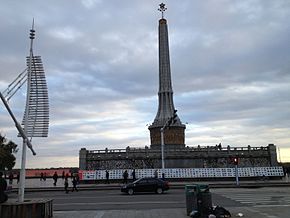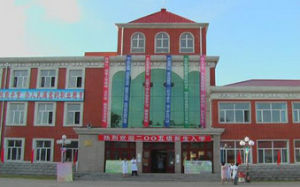Heilongjiang Forestry Health College
Jiamusi City, Heilongjiang Province
Introduction of Jiamusi
Jiamusi is a prefecture-level city in the province of Heilongjiang, in the People's Republic of China, located on the riverside of the middle and lower reaches of the Songhua River. Population 1,755,000.Nationalities: Han, korean, manchu
Location: Jiamusi is situated on the boarder of the Heilongjiang Province, with Harbin on its west, Shuangyashan on its east. It is separated from Russia by the Wusuli River (Ussuri River) in the east and the Heilongjiang River (Amur River) in the north.

History: Historical records list Jiamusi as an ancient bridle road of the Songhua River, leading to the Heilongjiang River estuary. It was once inhabited by the Sushen ethnic group, ancestors of the present Manchu group. There's no exact record of the origin of Jiamusi. It wasn't until the Twentieth Century that Jiamusi became the active town that it is now.
Physical Features: Jiamusi is located on the lower reaches of the Songhua River, neighboring the Sanjiang (Three Rivers) Plain formed by the Songhua, Heilongjiang and Wusuli rivers. Its terrain is low, with mountains beginning in the north, south and western areas of the city. Jiamusi's plains, which lie in its northeastern area, are flat and low.
Climatic Features: Jiamusi enjoys a cold temperate continental monsoon climate with an annual average temperature of 3 degree centigrade (37.4 degree Fahrenheit). The temperature elevates gradually leading up to the summer months, and gradually decrease after. Temperatures typically peak in July.
When to Go: The bitter cold of winter usually sets in around November, and spring sets in around March. The average temperature between April and October is above zero centigrade (32 Fahrenheit). June is probably the best time to visit Jiamusi, and is when the Sanjiang International Tourism Festival is held.
Special Local Products: Jiamusi is known for its freshwater fish and souvenirs that include fish skin costumes and fishbone ornaments.
Local Highlights:
In addition to the Han, Mongol, Hui ethnic groups, a population of Korean, Manchu and Hezhen ethnic minorities also reside in Jiamusi. Among the four ethnic townships, are two Korean (Xinghuo and Tangwang townships) and two for Hezhen (Jiejinkou and Bacha townships). Hezhen is known for its fishing culture throughout Northern China. The area's cuisine features many seafood dishes, and specialized clothing and ornaments are made of fish skin and bones.
Attractions:
Fuyuan Port is located at the area where the Heilongjiang and Wusuli Rivers converge. This is the only release for the waterways of Jiamusi City and Heilongjiang Province, and allows the water to run into the sea. The port faces Russia (across the river). Further downstream one will find the Russian cities of Komsomolsk and Nikolayev.
Honghe Nature Reserve is a wetland habitat of swans, wild geese and red-crowned cranes. Bird watching is best throughout the summer months. Jiejinkou is a compact community of the Hezhen people, located along the river in the Sino-Russia border. Here visitors learn the unique customs of the Hezhen indigenous group.
Wusu is a small but rich town. It is the largest fishing ground for salmon, and is seated along the easternmost end of China. The sun's rays strike Wusu first in China.
Other Scenic Spots : Wofoshan Skiing Resort, Sanjiang Nature Reserve
Travel Tips:
1. Jiamusi Airport is located on the southern portion of the Tongsan (Tongjiang-Sanya) Highway, 10 kilometers (6.2 miles) east of Jiamusi City. Here one can access flights to Beijing, Shanghai, Guangzhou and Harbin, as well as international flights to Khabarovsk of Russia. The railways in Jiamusi connect it with Harbin, Hegang, Mudanjiang and Shuangyashan, through which connections can be made with other cities.
2. Highways link Jiamusi with Harbin and Tongjiang. The long-distance bus station is in No.146, Zhanqian Lu, Qianjin District. Passenger liners also shuttle between Harbin and Jiamusi Section on the Songhua River throughout the summer months.
Introduction of Heilongjiang Forestry Health College
Heilongjiang Forestry Health College was founded in 1980 and was approved to be the state major secondary vocational school by National Educational Ministry. Jiamusi, a beautiful and rich-endowed city, is the place where our college is located. The college is the one keeps the sister relationship with the Dumke College of Health Professions of Weber State University of the U.S.A.


In the college, there are about eight departments, such as international nursing department, dental techniques department. There are 52 laboratories in our college, 43 practical bases and 21 community practical bases. And more than 300 faculties and more than 150 full-time faculties, there are 7 postgraduates and 6 current postgradutate students. Fifty percent of them are professors and twenty-six percent of them are lecturers. There are 7 members of the province academic research and academic institutions. There are 19 directors of studies in their chosen fields of learning. There are more than 4,700 students in college now and more than 1,190 students who got the short-time training programs in the college.
The college is the only place which offers the only site for The Test for Professional Doctor of Dental Hygiene, Medical Education Test System and also the Professional Doctor Test of Forestry Industry System that National Sanitary Authority set in the east of the Heilongjiang Province.
Nursing, Dental Techniques and Health Care are the largest and most comprehensive majors offering in the province. The college offers nursing, clinical medicine, dental techniques for the adult students. The associate postgraduate students can enter the general university to further study through the “Gallop Bridge” examination. And then the academic qualification was authorized by the nation.
The employment rate of the students keeps promoting in recent 3 years. In 2007, the rate of passing the exam got to 80.3% in one time, of passing the Registering Licence for Nurses to practice Exam reached 87%, of passing the Professional Qualified Dental Hygiene Test reaches 90%. The students graduated here are working all over the whole courtry, the students mainly work in the ZhuJiang Delta aroung GuangZhou, the Changjiang Delta around Shanghai and Jingjintang areas.
English Teachers Number required: 2-3 Posts
Requirements: Bachelor Degree and TESOL /TEFL. Some teaching experience preferred
Contract Period: 1st Mar, 2025 - 31st Jan, 2026
1st Sep, 2025 - 15th Jul, 2026
Monthly Salary: 10,000 RMB or above
Teaching hours: 16-18 hours per week
Age of students: 16-18
Accommodation: a free private furnished apartment on the campus;two bedrooms/ one sitting room/ european toilet/ shower / kitchen(basic cooking utilities are provided)/ colour TV /basic bedding provided(bedding,blanket,pillow etc)/ refrigerator/ furniture/ washing machine/ microwave/ telephone/ DVD/ internet/ all kinds of cooking utilities(plates,pots,pans)/ 24-hour supply of electricity/water/gas etc.
Internet access : internet access (broadband) in the apartment
Medical Insurance: Teachers will be covered with an accident to a maximum compensation of RMB 50,000. Therefore, teachers are advised to take adequate insurance cover before leaving their own country.
Paid Holiday : 2 days off per week; public holidays in China; 40-50 days for winter holiday
Work permit : The school will provide work permit for China at no cost to the teacher.
Air-ticket Reimbursement: On completion of a school year contract, a round way air-ticket reimbursement will be made
Airport: Jiamusi Airport